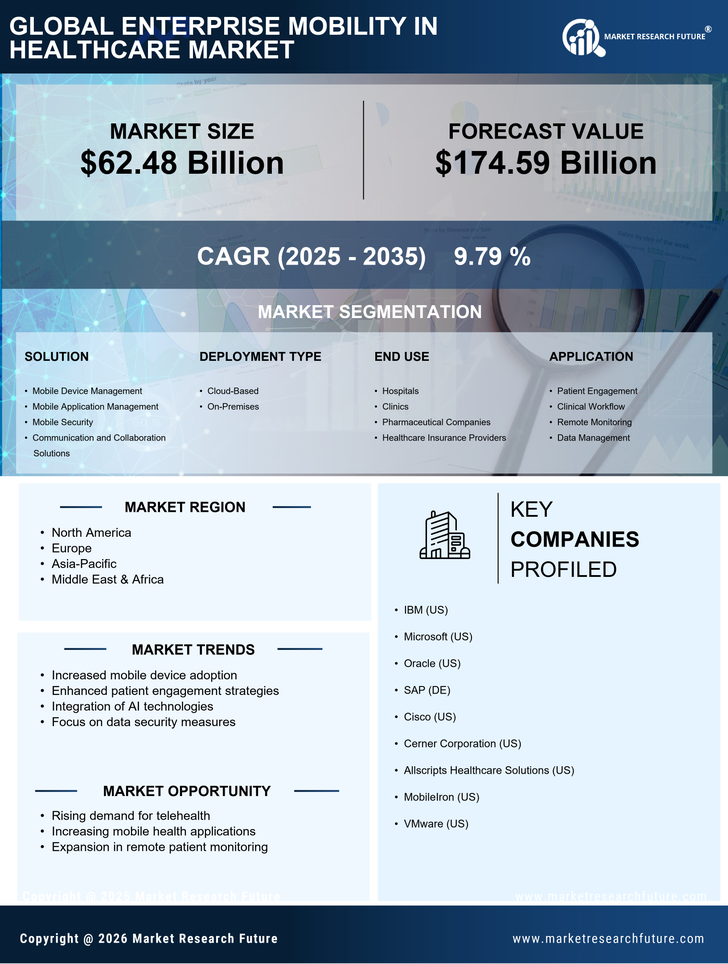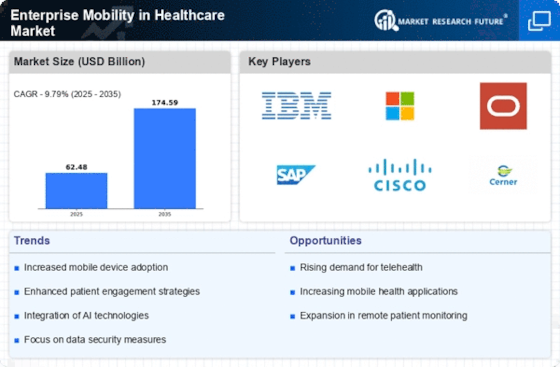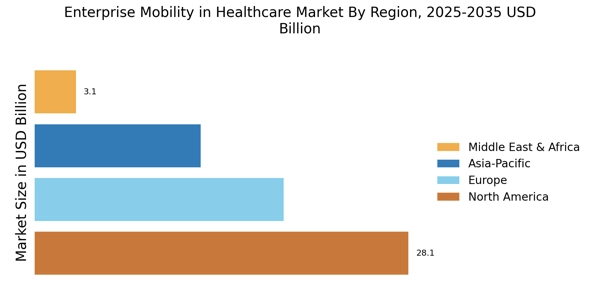Advancements in Mobile Technology
Technological advancements play a pivotal role in shaping the Enterprise Mobility in Healthcare Market. The proliferation of smartphones and tablets, coupled with enhanced mobile applications, has transformed how healthcare services are delivered. Innovations such as 5G connectivity and artificial intelligence are enabling real-time data sharing and improved patient outcomes. For instance, the market for mobile health applications is expected to grow significantly, with estimates suggesting a compound annual growth rate of over 20% in the coming years. These advancements not only facilitate better communication between healthcare providers and patients but also streamline operations within healthcare facilities, thereby driving the Enterprise Mobility in Healthcare Market.
Rising Demand for Telehealth Services
The Enterprise Mobility in Healthcare Market is experiencing a notable surge in demand for telehealth services. This trend is driven by the increasing need for remote patient monitoring and consultations, which have become essential in modern healthcare delivery. According to recent data, the telehealth market is projected to reach a valuation of approximately 250 billion dollars by 2027. This growth is indicative of a broader shift towards mobile solutions that enhance patient engagement and accessibility. As healthcare providers seek to improve service delivery, the integration of mobile technologies into telehealth platforms is likely to become a focal point, thereby propelling the Enterprise Mobility in Healthcare Market forward.
Growing Need for Operational Efficiency
The demand for operational efficiency in healthcare settings is a significant driver of the Enterprise Mobility in Healthcare Market. Healthcare organizations are under constant pressure to reduce costs while maintaining high-quality care. Mobile solutions offer a pathway to streamline operations, enhance communication, and improve workflow efficiency. For example, mobile applications that facilitate real-time data access and communication among healthcare teams can lead to faster decision-making and reduced administrative burdens. As healthcare providers seek to optimize their operations, the adoption of mobile technologies is likely to accelerate, further propelling the Enterprise Mobility in Healthcare Market.
Increased Focus on Patient-Centric Care
The shift towards patient-centric care is a driving force in the Enterprise Mobility in Healthcare Market. Healthcare organizations are increasingly prioritizing patient engagement and satisfaction, leading to the adoption of mobile solutions that empower patients to take an active role in their health management. This trend is reflected in the growing use of mobile health applications that provide personalized health information and support. Research indicates that patient engagement tools can lead to improved health outcomes and reduced healthcare costs. As healthcare providers recognize the value of mobile technologies in enhancing patient experiences, the Enterprise Mobility in Healthcare Market is likely to witness sustained growth.
Regulatory Support for Mobile Health Solutions
Regulatory frameworks are evolving to support the integration of mobile health solutions within the Enterprise Mobility in Healthcare Market. Governments and regulatory bodies are increasingly recognizing the potential of mobile technologies to improve healthcare delivery and patient outcomes. Initiatives aimed at promoting telehealth and mobile health applications are being implemented, which may include funding and incentives for healthcare providers. This regulatory support is crucial in fostering innovation and encouraging the adoption of mobile solutions. As policies become more favorable, the Enterprise Mobility in Healthcare Market is expected to expand, driven by increased investment in mobile health technologies.


















